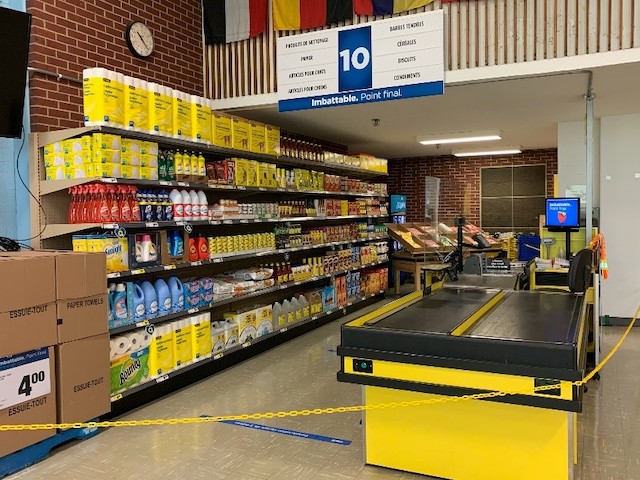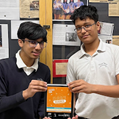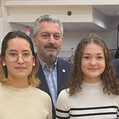Work training program offers opportunity to those with autism

During his many years as a principal, vice-principal and teacher in the education system, Nicholas Katalifos has heard his fair share of misconceptions surrounding those on the autism spectrum.
“A lot of people automatically assume that a person on the spectrum can’t work,” said Mr. Katalifos, Principal at the English Montreal School Board’s Wagar Adult Education Centre and chair of Giant Steps School and Resource Centre. “That is just completely wrong.”
To the contrary, Mr. Katalifos says those with autism offer added benefits to their employers.
“Most companies find they are exceptional employees,” said Mr. Katalifos, who is also the father of an 18-year old son on the spectrum. “They do their jobs well and they are happy doing their jobs. They might need different kinds of support, but they’re excellent employees. They are very reliable, very loyal and they’re happy to work, which helps the atmosphere at any company or organization.”
Mr. Katalifos is hoping a new pilot project at Wagar, resulting from a partnership with Giant Steps, the Transforming Autism Care Consortium (TACC), Weston, and the federal government, will bring these traits to the forefront.
The program recently had its official launch and you can see it here: https://youtu.be/PfYzUP9mNaA
Nine Wagar students, ranging in age from 21 to 62, are enrolled in an intensive nine-month bilingual work training program. Students meet daily with a Wagar teacher and two job coaches as they integrate and prepare them for future employment opportunities within the retail and supermarket distribution centre setting.
In addition to the theoretical training in the classroom, students are able to practice working the cash or stocking the shelves thanks to the installation of a mini-supermarket in one corner of the Wagar cafeteria. There are even virtual reality goggles students can wear to fully immerse themselves in the store. Other highlights of the program include online workshops, guest speakers, and an internship at a Maxi store or one of two distribution centres. If all goes well, a job offer with full pay and benefits may be given.
“It’s a good program because it’s practical and it’s real,” said Mr. Katalifos. “It can truly change the life of a person. We’re excited about it.”
Andre Pereira, Project Manager- Employment Initiatives at Giant Steps School and program coordinator, also notes intrinsic benefits to the initiative.
“We don’t just prepare them to find a job, but we’re looking at their personal development,” said Mr. Pereira. “We’ve seen, so far, some have evolved in terms of their independence. It’s the first time for many that somebody has asked them to make decisions. One of the big things we want to do is build up self-esteem.”
The program draws inspiration from one initiated by retired Walgreens senior vice-president Randy Lewis in the United States. Mr. Lewis, who has a son on the autism spectrum, presented an inclusive business model to the company’s board, outlining the importance and benefits of hiring not only those with autism, but other types of disabilities as well. Since the program launched 11 years ago, thousands of individuals with disabilities have been trained by Walgreens, with nearly 12 percent of employees at the company’s distribution centers currently self-identifying as having a disability.
Mr. Katalifos is grateful for the support and commitment from Weston CEO Richard Dufresne and all those within the Loblaw Company and their help in bringing the program north of the border.
“The people from Maxi have been superb,” said Mr. Katalifos. “They came in voluntarily and not only donated all the equipment and products in the cafeteria, but also volunteered their time to set it up. They are very supportive and are very excited about the whole thing. It wasn’t so much about the monetary donation, but their donation of their time. Everybody at Weston has been amazing.”
For Mr. Pereira, it has been an “eye-opening” experience thus far. Since the program first began in late August, he says participants are “listening to others” and showing “more respect to one another.” He also has seen many come out of their shells in the class setting, which has since translated to their home environments.
“One mother has e-mailed me to say her son is more present at home and helping out with chores,” said Mr. Pereira. “There is that direct effect of the program, where already he feels more empowered about himself. That was pretty rewarding, to hear her say how much he is enjoying the program and helping at home.”
Researchers at TACC are monitoring the progress of the program, with the hopes of scaling it and adding more students next year. Guides for both autistic adults looking for work and for employers in search of hiring autistic adults are also to be created in an effort to promote autism-inclusive hiring practices beyond the pilot project.
Please see the official Polaris Program press release: https://giantstepsmontreal.com/wp-content/uploads/2020/11/Polaris-Enterprise-Press-Release.pdf










